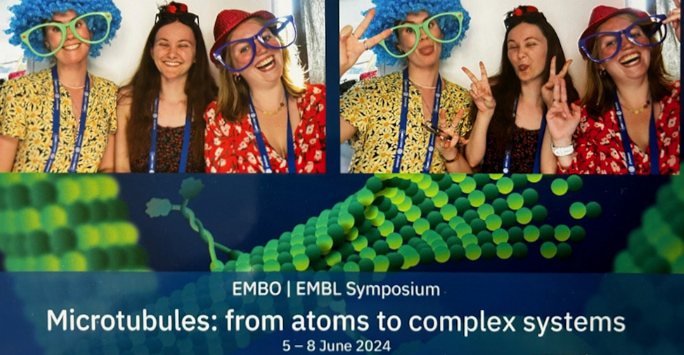
Eleanor Hargreaves is a third year PhD student in the Department of Biochemistry, Cell and Systems Biology. Eleanor discusses her research and her recent trip to Germany for an EMBO symposium on microtubules.
My research
Currently, I am a third year PhD student under the supervision of Dr Igor Barsukov and Professor Tobias Zech. My project focuses on the cytoskeletal network inside cells and in particular the network of proteins that surround the growing ends of microtubules.
Microtubules are vital for numerous cellular processes such as maintaining cell rigidity and shape, transportation of subcellular molecules and cell migration. They have shown to be dysregulated in countless diseases from neurodegenerative disorders like Alzheimer’s to multiple forms of cancer, making research into this area crucial.
Using a wide array of techniques that span from biophysical recombinant protein assays to cell culture, we aim to decipher the intricate binding mechanisms in this complex network and understand how they are regulated. Decoding this fundamental biological mechanism will help us to understand how they are altered in disease and identify novel therapeutic targets to potentially treat them.
EMBO/EMBL Symposium – Microtubules: from atoms to complex systems
Recently, with the help of an ISMIB travel grant, I was able to attend the EMBO symposium ‘Microtubules: from atoms to complex systems’ based at EMBL in Heidelberg, Germany. It is a four-day conference that takes place once every two years and is one of the few conferences around the world that is solely dedicated to the study of microtubules.
They had a wide variety of talks that covered a lot of my own personal interests in structural biology and cellular physiology. There were three keynote lectures from microtubule legends: Richard McIntosh, Anna Akhmanova and Nobutaka Hirokawa. It was really inspiring to see their decades of dedicated research to the field. I was lucky enough to speak to keynote Anna Akhmanova, who offered great advice on the direction of my project.
I presented a poster entitled ‘Targeting the EB1-SxIP interaction using small, engineered peptides alters cytoskeletal dynamics.’ I had many visitors who showed great interest in my work and some who offered to collaborate on projects in the near future.
I was extremely nervous to be attending such a large conference on my own however, the overall experience was irreplaceable. I was able to network with other academics and develop my presentation skills.
I am eagerly awaiting the next conference…especially the end of conference BBQ party.